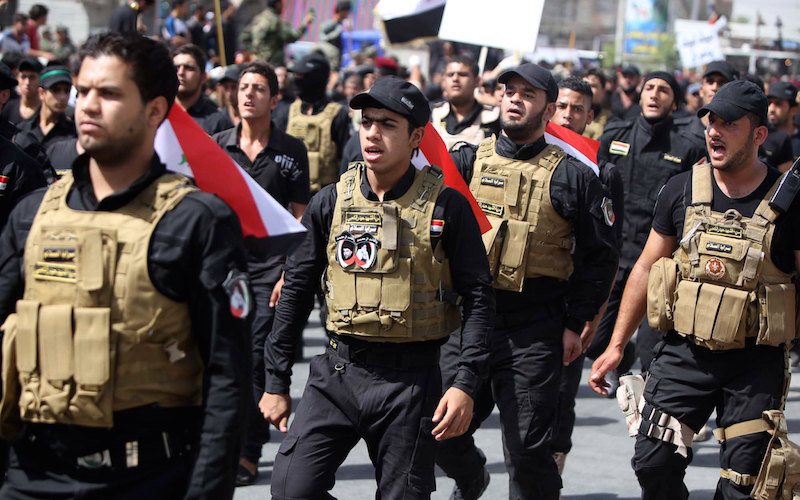
U.S. Policy on the Islamic State: Retying the Gordian Knot
In late September 2014, the Obama administration tacitly endorsed Iranian-backed Shia militias operating in Iraq. According to reporting by Josh Rogin and Eli Lake, American weapons originally intended to help Iraq’s military are being funneled to Iranian backed Shia militias.
According to Rogin and Lake, “U.S. weapons intended for Iraq’s beleaguered military are winding up in the possession of the country’s Shiite militias, according to U.S. lawmakers and senior officials in the Barack Obama administration. These sources say that the Baghdad government, which was granted $1.2 billion in training and equipment aid in the omnibus spending bill passed last month, is turning hardware over to Shiite militias that are heavily influenced by Iran and have been guilty of gross human-rights violations.” The Obama administration is caught in an untenable position. Was this merely a tough decision to work with Iran or the wrong decision for the United States and its coalition partners currently conducting air strikes throughout Iraq?
In October 2014, Amnesty International delivered a scathing report regarding crimes committed by paramilitary groups and militias in Iraq. In light of this, and prior acts of terrorism committed by Iran’s Quds force, the fact that the Obama administration is condoning the operation of Iran’s Quds force, fighting alongside Shia militias that it trained such as the Badr force, is both vexing and astounding.
First, because the Iranian commander of the Quds force, Qassem Soleimani, has been unrelentingly in his support of the embattled Syrian regime which is strategic to Iranian foreign policy and the aspirations of the Supreme Leader Ali Khamenei.
Soleimani has maintained since 2013, that Iran will support Syria in the face of any US-led military strikes. Iran is Syria’s main regional ally and a number of analysts believed a wider goal of President Obama’s determination to launch a strike against the Damascus regime was to blunt Tehran’s growing regional influence and any consequential threat to Washington’s ally Israel. However, with Iran’s threats to attack Israel if the US air strikes were directed against the Assad regime, still no such action has occurred.
Soleimani has also stated on the record that “The aim of the United States is not to protect human rights…but to destroy the front of resistance (against Israel) [and] We will support Syria to the end,” in a speech to the Assembly of Experts, the body that supervises the work of supreme leader Ayatollah Ali Khamenei. However, he did not elaborate on the nature of the support and Iran has constantly denied allegations by Western powers that it has sent military forces to prop up President Bashar al-Assad’s regime. This last claim is now patently false and the reference to upholding human rights is the epitome of hypocrisy given the horrendous human rights record of both the Quds force and the regime it serves. To highlight this, we need only look at the covert (so-called) black operations of the Quds force in the past. These include the conduct of a state sanctioned program of assassinations around the world, the financing and training of terrorist organizations such as Hamas and Hezbollah, as well as the training and support for Shia militias that have operated in Iraq since 2003, killing hundreds of US servicemen, while under the protection of the al-Maliki administration.
An excerpt from a recent Amnesty International report, entitled “Militias operate with absolute impunity: Militia Rule in Iraq,” provides harrowing details of sectarian attacks carried out by increasingly powerful Shia militias in Baghdad, Samarra and Kirkuk, apparently in revenge for attacks by the Islamic State (IS). Scores of unidentified bodies have been discovered across the country handcuffed and with gunshot wounds to the head, indicating a pattern of deliberate execution-style killings…By granting its blessing to militias who routinely commit such abhorrent abuses, the Iraqi government is sanctioning war crimes and fuelling a dangerous cycle of sectarian violence that is tearing the country apart. Iraqi government support for militia rule must end now,” said Donatella Rovera, Amnesty International’s Senior Crisis Response Adviser.
Although top US officials continue to deny “direct” coordination with Iran they acknowledge the presence of the Iranian regime and the notorious Quds force operating with the Shia militias in Iraq. This semantic technicality may be construed as tacit or “indirect” coordination with the agent- provocateur of the crisis in an attempt to resolve the crisis. It has been reported that because of this some local Iraqis have become so disillusioned by the atrocities committed by the government backed Shia Militia and other paramilitary groups that they are joining IS in a desperate attempt to defend themselves. The Washington Times noted in September that the militias are fighting with Quds force alongside them. Because of this it stands to reason that the Quds force units operating with the militias must have knowledge of, or worse complicity in the commission of the reported atrocities. This is not the first time that Quds force has been implicated in acts of extraterritorial violence and paramilitary action. Indeed, this is typical of the Quds force modus operandi.
The fact that the “Shia militias” are operating with ‘absolute impunity’ as reported by Amnesty International and continue to be reported into early 2015, committing crimes against the Sunni population clearly indicates that the Iraqi Government is at worst backing them or is at best incapable of controlling them. Evidently, the US is also turning a blind eye to these crimes as if by ignoring them the situation will improve, while it is otherwise pre-occupied with the Islamic State and Syrian issues. This is arguably the same mistake it made during Maliki’s tenure. For years the United States was warned about the deteriorating situation in Iraq, the influence of the Quds Force in the country and crimes committed by the paramilitary groups and Iraqi security forces under Maliki. Little if anything was done to contain Maliki or to evict the Iranian regime’s agents from Iraq. This situation has since worsened with new PM al-Abadi welcoming the Iranian Militias into Iraq as a part of the ground force component to combat IS, effectively legitimizing the Iranian military and paramilitary contingent. This is despite the fact that Shia militias have been committing atrocities against the Sunni population in Diyala Province.
This makes a travesty of the Obama administration’s continuing the long practiced (multi-US administration/bipartisan) policy of appeasement with respect to Tehran. The statement in late 2014, by Israel’s Prime Minister Benjamin Netanyahu, that the west should beware of a smiling Iranian regime because if Iran “achieves nuclear weapon capability all smiles will stop” has an ominous ring of prescience…yet the Obama administration continues to send signals welcoming Tehran to the fight. The policy of appeasing Tehran appears to be as entrenched in US foreign policy over recent years as it was among Britain’s foreign policy elites during the 1930s vis-a-vis Nazi Germany…a policy that was to say the least, catastrophically unsuccessful.
So the question is why doesn’t anyone (from within or without) recognize and inform the Obama administration that the policy is failing dismally and a firmer approach is justified. Given the threat posed by the Iranian regimes’ nuclear program and the potential for Israeli strikes against Iran’s nuclear installations, such as it conducted in 2010, further sanctions would be reasonable. I am not advocating war or the abrogation of US soft power initiatives, but at the very least I would propose a more determined enforcement of sanctions is required (as opposed to having them ignored) by those who have agreed to them e.g. the allegedly “US-friendly” Iraq? This would certainly resend a message to Iran, at the same time as allowing the Obama administration to maintain the current level of sanctions imposed on Iran that the President intends according to the policy direction signaled in his recent state of the union address. As the US continues its policy of appeasement and even tacit collaboration, Iran is daily emboldened and entrenching its influence in the region.

